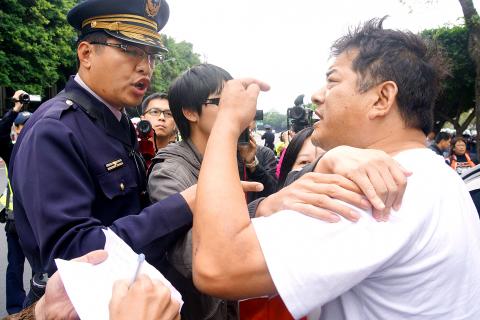Residents of Taipei’s Huaguang (華光) community gathered in front of the Ministry of Justice in the capital yesterday, bringing along rubble to protest against the ministry’s forced demolition of their homes.
The controversy over the land on which the community stands began in 2006 after a project to transform it into one of the four economic and digital technology centers was unveiled.
In 2009, the area was rezoned as a commercial rather than residential area.

Photo: CNA
Last year, the Executive Yuan approved plans to remodel the area into a “second Roppongi district” — a district in Tokyo famed for its nightclubs — and officials began measuring all the buildings in the designated area in November.
Although the Executive Yuan initially intended to demolish the entire area before Dec. 31, then-Executive Yuan secretary-general Steven Chen (陳士魁) decided that the project overlapped with urban renewal projects and turned over the remodeling of the area to the Construction and Planning Administration.
Located close to the Chiang Kai-shek Memorial Hall and spanning 11 hectares of land, the community — where the demolition of buildings was scheduled to begin yesterday — has been home to soldiers and their famlilies who were unable to obtain living quarters after the Chinese Nationalist Party (KMT) relocated to Taiwan in 1949.
Following the first wave of demolitions last month, during which seven buildings were bulldozed, the ministry demolished two more buildings on Hangzhou Road yesterday.
About 30 residents and their supporters placed pieces of a demolished wall and other rubble in front of the Ministry of Justice in protest.
Police warnings that they would remove the rubble sparked outrage among the residents, who said the government was now trying to take even the rubble after it had already robbed them of their homes.
Wearing white shirts printed with blood stains, the residents lay on the ground in protest, accusing the ministry of violating their human rights and attempting to manipulate the judicial system to force them into a tight corner.
The residents left the site after calling for the demolition to be halted until the government comes up with an acceptable relocation plan, punctuating their last call with a rush at police guarding the ministry.
Meanwhile, ministry official Yang Ho-chin (楊合進) said that the government was executing its legal duty to demolish the properties before turning the land over to the Ministry of Finance.
Legally, the justice ministry cannot delay the demolition process, Yang said, adding that the Taipei City Government had agreed to provide 57 public housing units to help with the relocation of Huaguang community residents.
The Ministry of Justice planned to meet with community residents to discuss the issue yesterday, but the residents said that as they had not received any formal notification from the government about the meeting they refused to attend.

‘DENIAL DEFENSE’: The US would increase its military presence with uncrewed ships, and submarines, while boosting defense in the Indo-Pacific, a Pete Hegseth memo said The US is reorienting its military strategy to focus primarily on deterring a potential Chinese invasion of Taiwan, a memo signed by US Secretary of Defense Pete Hegseth showed. The memo also called on Taiwan to increase its defense spending. The document, known as the “Interim National Defense Strategic Guidance,” was distributed this month and detailed the national defense plans of US President Donald Trump’s administration, an article in the Washington Post said on Saturday. It outlines how the US can prepare for a potential war with China and defend itself from threats in the “near abroad,” including Greenland and the Panama

A wild live dugong was found in Taiwan for the first time in 88 years, after it was accidentally caught by a fisher’s net on Tuesday in Yilan County’s Fenniaolin (粉鳥林). This is the first sighting of the species in Taiwan since 1937, having already been considered “extinct” in the country and considered as “vulnerable” by the International Union for Conservation of Nature. A fisher surnamed Chen (陳) went to Fenniaolin to collect the fish in his netting, but instead caught a 3m long, 500kg dugong. The fisher released the animal back into the wild, not realizing it was an endangered species at

The High Prosecutors’ Office yesterday withdrew an appeal against the acquittal of a former bank manager 22 years after his death, marking Taiwan’s first instance of prosecutors rendering posthumous justice to a wrongfully convicted defendant. Chu Ching-en (諸慶恩) — formerly a manager at the Taipei branch of BNP Paribas — was in 1999 accused by Weng Mao-chung (翁茂鍾), then-president of Chia Her Industrial Co, of forging a request for a fixed deposit of US$10 million by I-Hwa Industrial Co, a subsidiary of Chia Her, which was used as collateral. Chu was ruled not guilty in the first trial, but was found guilty

DEADLOCK: As the commission is unable to forum a quorum to review license renewal applications, the channel operators are not at fault and can air past their license date The National Communications Commission (NCC) yesterday said that the Public Television Service (PTS) and 36 other television and radio broadcasters could continue airing, despite the commission’s inability to meet a quorum to review their license renewal applications. The licenses of PTS and the other channels are set to expire between this month and June. The National Communications Commission Organization Act (國家通訊傳播委員會組織法) stipulates that the commission must meet the mandated quorum of four to hold a valid meeting. The seven-member commission currently has only three commissioners. “We have informed the channel operators of the progress we have made in reviewing their license renewal applications, and